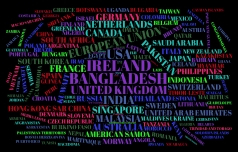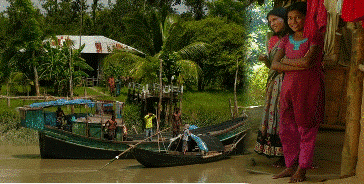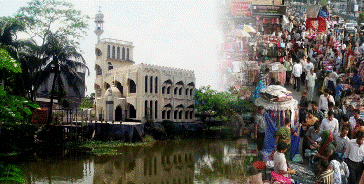 I bought body moisturiser yesterday in the supermarket and failed to notice, until I got home, that it had ‘skin lightening’ properties. In the West, many pale-skinned people strive for a tan and browner skin. For women in Bangladesh, and to a certain degree men, lighter skin is the ideal. There can be cultural pressure in this regard, reinforced by the media and the beauty industry. It’s a sensitive issue. Lighter skin is held up as being more attractive. There are numerous beauty salons that offer ‘whitening’ treatments e.g. near where I live there is the ‘Fair and Care Beauty Parlor’ and the ‘Fair Touch Beauty Parlor.’
I bought body moisturiser yesterday in the supermarket and failed to notice, until I got home, that it had ‘skin lightening’ properties. In the West, many pale-skinned people strive for a tan and browner skin. For women in Bangladesh, and to a certain degree men, lighter skin is the ideal. There can be cultural pressure in this regard, reinforced by the media and the beauty industry. It’s a sensitive issue. Lighter skin is held up as being more attractive. There are numerous beauty salons that offer ‘whitening’ treatments e.g. near where I live there is the ‘Fair and Care Beauty Parlor’ and the ‘Fair Touch Beauty Parlor.’
The billboard pictured above is a ubiquitous one, advertising a well-known Unilever product called Fair and Lovely. The billboards usually feature a photograph of a fair(er)-skinned Bangladeshi woman. In the version pictured here, a progression from darker to fairer skin is promised with the use of their skin-lightening product range. I find it strange when people with beautiful brown skin compliment me on my skin. On the bus, for example, women will often rub my hand or arm enviously and sigh ‘shundor’ (beautiful). I return the compliment and try to explain that mine is the kind of skin that burns easily in the sun, and is more prone to skin cancer too, but of course this is not the issue.
I can understand the power of advertising and cultural pressure: when I was younger I made an annual effort to get an even, all-over tan. Now that I am older, I am happier in my skin, so to speak! In any case, the ideal of tanned skin lost its appeal somewhat with the growing awareness of skin cancer. It’s a funny old world, with many who are darker-skinned trying to be lighter and many who are lighter-skinned trying to be darker, all of us brainwashed by advertising and related media notions of ‘beauty’.
I was unaware till recently of the controversy surrounding Unilever’s advertising campaigns in Asia and elsewhere, in relation to this product. I don’t have TV, so I hadn’t seen any of their adverts. (In a 2006 publication it was reported that Unilever spent $7 million advertising Fair and Lovely in Bangladesh.) The much-aired advertisements centre around various portrayals of a woman moving from a life of depression, with no prospects, to a brighter happier life, full of opportunity, as her skin becomes lighter in colour.
There are those who suggest that such marketing strategies feed into existing sexist and racist prejudices. There are arguments that such excessive advertising overpowers the voices of organisations fighting to empower women. The same argument could be made about so many other procedures and products in the ‘beauty industry’ e.g. the advertising of anti-aging products. Are these sexist and ageist? Some would disagree. They argue that women should have the ‘choice’ to aim for lighter skin in the same way that some white women ‘choose’ to aim for darker skin, if it makes them ‘feel better’. In the final analysis do any ‘beauty products’ really work? (That is, apart from making clever corporations rich.) They won’t change the skin colour that we were born with, and we are all destined to age, despite what powerful advertising campaigns might tell us.

 On March 15th 2009 I left Ireland to spend 13 months in Bangladesh as a
On March 15th 2009 I left Ireland to spend 13 months in Bangladesh as a 







 I am especially conscious that I am writing about an Eastern culture from the perspective of a Western observer. The opinions expressed are my own - unless otherwise stated. Should you perceive inaccuracy or misrepresentation, in this regard or in any other, or you would like to add something, I would welcome your observations. Leave a comment below the relevant post(s).
I am especially conscious that I am writing about an Eastern culture from the perspective of a Western observer. The opinions expressed are my own - unless otherwise stated. Should you perceive inaccuracy or misrepresentation, in this regard or in any other, or you would like to add something, I would welcome your observations. Leave a comment below the relevant post(s).
Great post (and great blog). I totally agree. Wouldn’t it be great if we could visit our future, wiser selves and dismiss all this bullshit.
Too true! Thanks for commenting.